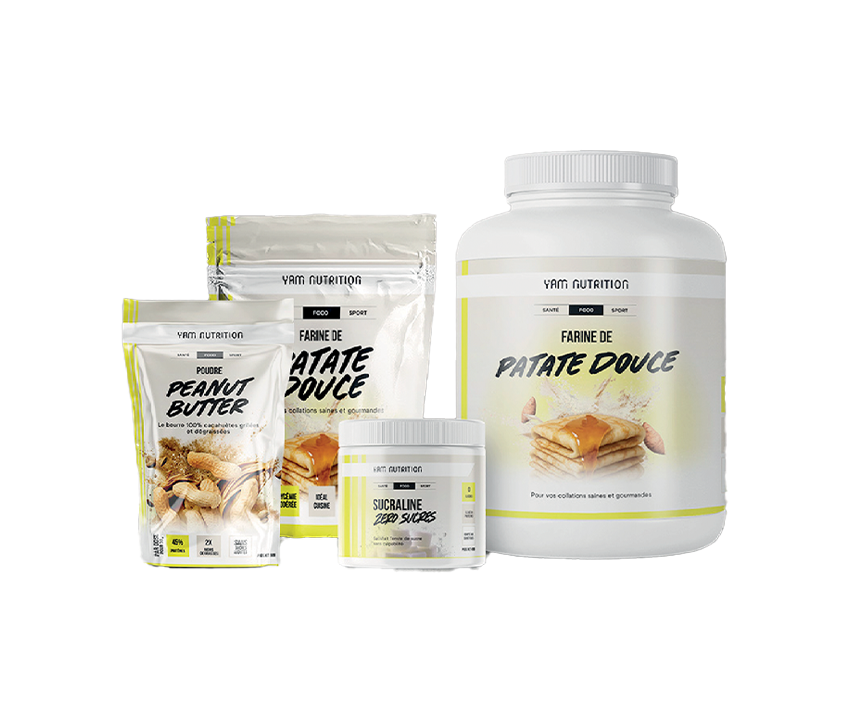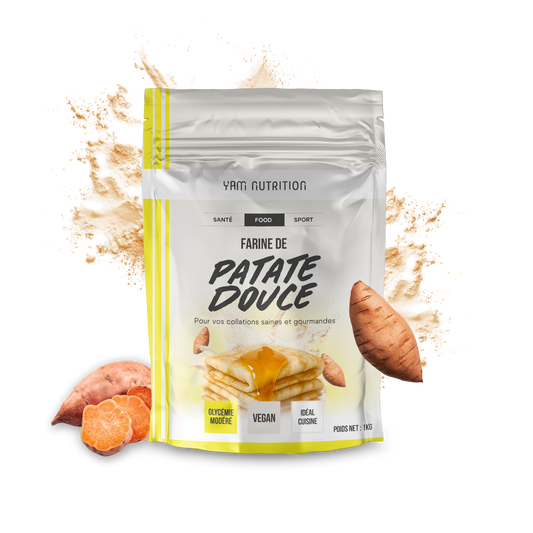Carbohydrates in your diet

Sommaire
Practicing an endurance or strength sport necessarily assumes that your body and your muscles will consume a very large quantity of carbohydrates, the first energy substrate towards ATP, adenosine triphosphate. As you know, ATP allows your muscle cells to contract. In the amateur bodybuilding world, a large number of false assumptions about carbohydrates circulate, especially among beginners. The latter never take into account the vital importance of carbohydrates, certainly more preoccupied with worrying about their intake in creatine monohydrate and in protein . However, scientific literature confirms the simple fact that if you do a sport of strength , you will necessarily consume a large quantity of carbohydrates. This is quite obvious because anaerobic glycolysis, in other words the use of glucose without oxygen, very quickly takes over from phosphocreatine in order to synthesize ATP. Obviously, you can't do without these essential nutrients, even during the cutting phase. Besides, whether you're gaining mass or cutting, if you know how to manage your carbohydrate intake effectively, you'll have already done more than half the job...
Carbohydrates in your diet, your energy base
Your diet is the primary source of carbohydrates for your body and muscles. However, not all carbohydrates provide the same response to insulin and therefore will not necessarily be stored in the same way. This is why the concepts of Glycemic Index and Glycemic Load were scientifically developed. Naturally, most food Unprocessed and unpackaged foods have a higher level of complex carbohydrates than processed foods. For example, the grains used to make bread have a basic average amount of carbohydrates that are gradually absorbed by your body, if you take wheat seeds for example. The grain membrane and the fiber it contains contribute to making wheat seeds a source of slow carbohydrates. However, to make bread, the membrane has been removed and the seeds ground into flour, which accelerates the assimilation of its carbohydrates. flour is then to be considered as a source of refined carbohydrates with rapid assimilation.
Fast sugars or slow carbohydrates, does it really make sense scientifically?
You now understand why we talk about carbohydrates or fast sugars Or simple carbohydrates as opposed to carbohydrates slow . From this, you also understand why the concept of Glycemic Index proves to be imprecise and inadequate to account for the body's reaction to the ingestion of these macronutrients. The Glycemic Load is more precise on this subject because it takes into account the quantity of carbohydrates that have been consumed. This difference between considering a fixed quantity of glucose of 50g for the Glycemic Index Unlike Glycemic Load, which considers all carbohydrates consumed, it allows for a more accurate estimate of the fate of carbohydrates in the body. Obtaining a more accurate estimate of your glycemic load will certainly be more useful to you in an athletic context (glycogen replenishment) or if you are diabetic.
Consume slow sugars to stimulate a gradual replenishment of your glycogen without causing an insulin spike
In any case, the ideal will always be to promote a slow or gradual rise in blood sugar while allowing optimal replenishment of your glycogen stores. To this end, the Glycemic Index is not able to help you see clearly. Consuming a high quantity of foods rich in refined carbohydrates may not really be optimal for your health, especially if an overload of fat complicates the problem. This same problem will often worsen when sugars are added to your foods under the pretext of giving them flavor when it is absolutely not necessary. These added sugars will only increase the total calories, without knowing if you really need them.
As you can see, the ideal is always to eat several meals relatively rich in carbohydrates and not to overload your body during a single meal. This method will allow you to gradually replenish your glycogen reserves while avoiding insulin spikes and a too rapid rise in blood sugar. In the same vein, we could consider that a food is a good source of carbohydrates if it is not too rich in fat, unless it is rather Omega 9 and that the report Omega 3 /Omega 6 is beneficial. The same applies if it contains a moderate amount of fiber and is rich in micronutrients such as vitamins, minerals, and antioxidants.
Some quality foods containing a significant amount of carbohydrates
Buckwheat (72g/100g of carbohydrates), barley (71g/100g), millet (62g/100g), oats, amaranth, quinoa (57g/100g), plantain (31g/100g), brown rice, Sweet potato , almonds (only 23g/100g), passion fruit, lentils, hazelnuts (only 17g), 85% dark chocolate (only 16g), chickpeas, mango, pecans. These few examples can be considered good sources of carbohydrates but there are many others. However, also remember that they are not only energy reserves but also provide you with micronutrients such as vitamins, minerals and antioxidants.
On the other hand, with regard to so-called sugars simple Or fast foods , we could mention: apple juice, refined breakfast cereals, fruit syrup, rice cakes, white rice, pastries, rusks, industrial biscuits and many others. However, it will be necessary to take into account the assimilation of these foods into the food bolus during a meal. This is precisely what we said above by quickly reminding you of the difference between the Glycemic Index and the Glycemic Load. From there, consuming simple sugars from time to time is not really problematic if you are not diabetic but avoid making it a habit. It will always be simpler and less risky to take sources of complex carbohydrates, containing fiber and micronutrients than to consume empty calories unnecessarily. Obviously, the human body is naturally made to eat foods that are as complete and healthy as possible. This will always be the simplest way to recharge your main reserve of muscular energy , glycogen. It is precisely this energy reserve that will serve you during training . strength training, cardio, or endurance training. Then, you can consider your protein and supplement needs.
YAM Nutrition
Eric MALLET
Spécialiste en Nutrition Sportive



